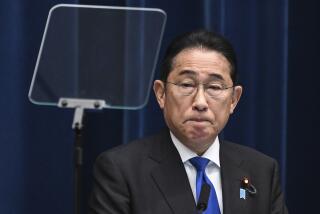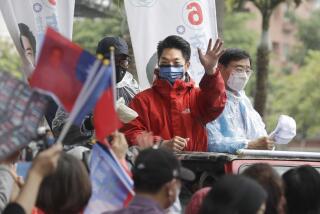Japan’s Socialists Grope for Leadership : With its support at a low ebb, the party is about to elect a new chairman. Reformers are pushing for radical changes in policies.
- Share via
TOKYO — The Socialists, Japan’s perennial opposition leaders, who scored record gains in national elections in 1989 and 1990, again are looking for a leader capable of transforming the party into one that voters can trust to take over the government.
With support in polls barely above 10%, the 120,800 party members will vote Sunday and Monday for a new chairman.
Reform-minded veterans hope a new leader will tackle problems ignored by onetime miracle-maker, Takako Doi, 62, the only woman ever to lead a major political party in Japan. Doomed by a debacle in local elections in April, she submitted her resignation in June after the party’s executive council approved a tepid reform plan.
The chief task, reformers say, is to overhaul the party’s advocacy of unarmed neutralism, born in Japan’s defeat in World War II, and begin offering realistic alternatives to policies of the ruling Liberal Democratic Party. That party has controlled the government since 1955.
Equally important is breaking a stranglehold that entrenched politicians and labor union bosses have over endorsements for candidates--an anachronism that prevents the Socialists from fielding enough candidates to win a majority in parliamentary elections. A two-week campaign, however, showed that no consensus has emerged on the need for reform.
Heavily favored to win is Makoto Tanabe, 69, a party vice chairman and author of the June reform program. He is backed by the right wing, to which about 80% of the party’s Parliament members belong. Opposing him is Tetsu Ueda, 63, a former journalist and the champion of the Marxist-imbued left wing, which includes about half the party’s staff and most of its grass-roots activists.
Ueda made reversion to the past his chief campaign plank. He accused Tanabe of seeking to eliminate restrictions on Japan’s military by reinterpreting the Japanese constitution, which forbids the maintenance of armed forces. Socialists, he insisted, must reaffirm their traditional principles of unarmed neutrality and opposition to the U.S.-Japan Security Treaty. “The issue is whether we revise the constitution or whether we defend the constitution--only that,” he declared.
Tanabe insisted that he shares Ueda’s commitment to the ideal of forgoing the maintenance of armed forces--although the reform plan he wrote overturns the party’s opposition to sending troops overseas to participate in disaster relief and U.N.-sponsored peacekeeping activities.
“Socialists have reached a point where the voters are wondering if the party has any meaning in Japanese politics,” Tanabe said. Instead of merely opposing government proposals, he vowed to create a “shadow cabinet” with “ministers” charged with formulating bills and policies as alternatives to ruling party proposals.
By fanning anger against a 3% consumption tax, Doi boosted support in the polls for the Socialists to 30.6% on the eve of a 1989 election that deprived the Liberal Democrats of their majority in the upper house of Parliament.
But voters turned away when she appeared to side with Iraqi President Saddam Hussein in the aftermath of Iraq’s invasion of Kuwait, said Katsumi Samada, staff director of the Socialists’ upper house policy board. With no peace plan of her own, Doi visited Baghdad last fall and was shown on TV smiling and shaking Hussein’s hand. “When I saw that, I wanted to dig a hole in the ground and crawl into it,” Samada said.
As anti-Hussein sentiment grew, Doi accelerated the Socialists’ isolation by insisting that Japan refrain from making any contribution--money or manpower--to the U.S.-led multinational forces in the Gulf.
Doi is still widely credited with arousing the long-dormant political power of women. But “too often, we forgave her mistakes--because she was a woman,” said Tamio Kawakami, the son of a former party chairman who retired from Parliament last year.
As she announced her resignation last month, support for the Socialists had plummeted to 11%, a poll showed.
More to Read
Sign up for Essential California
The most important California stories and recommendations in your inbox every morning.
You may occasionally receive promotional content from the Los Angeles Times.










